
Conversations around artificial intelligence are often binary and seen as something that will either save or destroy the world. That’s according to Danil Mikhailov, executive director of data.org — an organization created to harness the power of data and AI to tackle global challenges. “Our position is more nuanced. We believe AI is a very powerful tool if it's deployed responsibly with community consent and trust,” Mikhailov said. When designed and applied with caution and intention, “AI can solve real problems facing communities in health, financial inclusion, and climate.”
Strengthening the capacity of people and organizations is key to data.org’s mission. As a result, it’s aiming to train 1 million purpose-driven data practitioners by 2032 and is already on track to support 100,000 data scientists, data analysts, and data engineers through its global training programs. Implemented through a network of partners, these programs are focused on interdisciplinary skills and practical application, explained Mikhailov.
Through partnerships, the organization also creates open-source software tools for use by social impact organizations, which typically don’t have access to the sophisticated tech stack and tools that the private sector does. And, where social impact organizations are using AI and data tools in innovative ways, “we try to uplift them, tell those stories, and help them scale,” he said. This is usually done via “challenges” where teams from around the world are invited to compete and showcase their ideas on how AI could best be used. A recent challenge, hosted together with Microsoft, empowered teams to use generative AI to upskill themselves and their communities, while a second challenge in collaboration with the Mastercard Center for Inclusive Growth seeks to scale AI solutions to accelerate inclusive growth.
“To solve the complex problems we face, we need all sectors to find a way to work together. … Each sector has something to contribute, and each sector lacks something.”
— Danil Mikhailov, executive director, data.orgMikhailov spoke to Devex about how data.org and its network of partners are facilitating the use of technologies across the social impact sector.
This conversation has been edited for length and clarity.
There are plenty of groundbreaking data and AI-driven technologies, tools, and strategies being developed. Why can there still be challenges in sharing and scaling these?
It can seem like there's a lot of AI-powered tools out there, but it's a very uneven situation. In the private sector, the use of AI is accelerating, but in the social impact sector, that's not necessarily the case as the sector is underresourced and has problems accessing talent in data science and AI. There are some good outliers, particularly where there is a social impact effort from within a tech company. For example, Google DeepMind deploying AlphaFold, which is a really advanced AI technology to predict the shape of proteins and other molecules. In the climate data space, teams like Planet are collaborating with Microsoft’s AI for Good teams to produce amazing analyses of satellite data and apply them to social impact purposes. If we focus on nonprofits, there are examples like GiveDirectly — whom data.org supported as part of our 2021 Inclusive Growth and Recovery Challenge — using machine learning and AI targeting to facilitate cash transfers to the poorest people in Togo. But, all too often, it's high-resource organizations doing philanthropic work and social impact organizations themselves are lagging behind because the resource gap is too great.
data.org recently organized the first-ever Accelerate: Data for Social Impact Conference, which brought together more than 100 cross-sector leaders to discuss the potential of leveraging data and AI to mitigate and adapt to climate change. Can you tell us a bit more about the conference and your key takeaways?
We tried to focus the conference on impact and were intentional in making sure the speakers and attendees were from different sectors, including academic, social impact, philanthropic, public, and private sector. To solve the complex problems we face, we need all sectors to find a way to work together. One of the key takeaways is that this is possible and people are enthusiastic to cross sector boundaries.
Each sector has something to contribute, and each sector lacks something. Academia, for example, is great in establishing the fundamentals of the discipline and pushing forward the boundaries of innovation, but they're not very good at producing products. The private sector can come in and help with that, while the social impact sector can help build trust within communities and co-design effective data-driven innovations.

What role does capacity development play in building the field of data and AI for social impact?
Capacity is the most important focus. Nothing else works if you don't have smart people in the next generation with the skills to deploy great projects and innovations.
In terms of how they work, more interdisciplinary skills are important. In the social impact sector, we're dealing with human beings and structural inequalities, the goals are often complex, and the challenges are systemic. Looking at the health of a community, for example, you need to consider not just direct health outcomes, but also social determinants of health or how climate change can impact health indirectly. For a complex problem, you need people who are trained in more than one discipline and have the skills and training to work with vulnerable communities. In the courses that we co-design with our university partners, we make sure to integrate these skills and address questions around the longer-term consequences of technology.
“When there is trust, communities will reveal more knowledge — often informal knowledge which is missed when we create the data sets without community involvement.”
— Danil MikhailovThe questions data scientists ask when they build tools inevitably open up some areas for innovation and not others. Those design decisions matter. To ask the right questions, data scientists need to be representative of their communities, but our sector is dominated by young white men in their twenties. There are questions that even with all the best intentions, they just will not think to ask because they don't have the lived experience. Therefore, we care about who and where the people are that we're training, and if they are as diverse as the communities they will work with. With our talent programs, we focus on building capacity in low- and middle-income countries as well as low- or middle-income settings in high-income countries because it's important that the people with the technical skills are trained next to the communities who will be using their products.
There's also a new digital divide being created because most of the generative AI models are trained on just English and Mandarin Chinese. It's not only a matter of translation, but what's missed is the nuance, the idioms, and the oral knowledge in other languages. To catch that richness of cultural context, you need to have the digitized data in that native language. Many of our capacity-building programs are beginning to focus on training people with the skills to digitize the languages that are being excluded and to train AI models in those languages, and then to design with them social impact products grounded in local knowledge.
When we talk about ensuring that data-driven solutions are inclusive, diverse, and equitable — what would that look like, and what efforts are made to ensure solutions meet these criteria?
It starts with understanding that to make tools such as AI responsible, the data they're trained on must be inclusive and representative. But before that, we need to ensure that the communities about whom the data is produced are involved in the process. This involves sharing power with those communities, co-designing with them, making sure that they derive the value from the innovations that use their data, so the process is not extractive and the value is invested back in the community. Through fair involvement of communities, not only are products more equitable, but they're also more effective. When there is trust, communities will reveal more knowledge — often informal knowledge which is missed when we create the data sets without community involvement.
That’s how you get to inclusive, diverse, and equitable data-driven solutions. What it looks like in practice is exemplified by our recent Generative AI Skills Challenge awardee, the Myna Mahila Foundation. As part of their challenge project, Myna is leveraging generative AI to power a text-based AI platform designed to dispel misconceptions about women’s sexual and reproductive health. Their AI solution, crafted by and for women, is deeply rooted in an intimate understanding of the community’s norms, complexities, and needs while delivering accurate, vetted information. Furthermore, the local languages, dialects, and slang used in this AI platform not only provide easier community adoption but also innovate beyond English-centric large language model understanding. Real-world applications like these show the true power of data and AI for social impact.
Do you have an innovative AI solution ready to scale to accelerate inclusion and economic empowerment? Enter the Artificial Intelligence to Accelerate Inclusion Challenge by July 18, 2024.
Search for articles
Most Read
- 1
- 2
- 3
- 4
- 5








